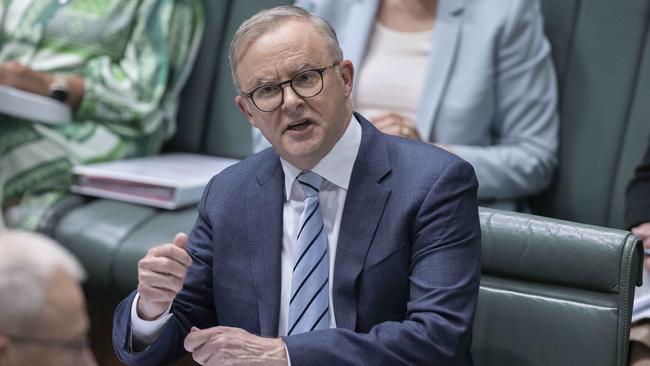Labor is failing badly on the voice referendum

We were instinctively opposed to tinkering with the Constitution. Yet Abbott was committed to constitutional recognition of Australia’s Indigenous people. So Leeser and I committed ourselves to trying to help him find a way of doing this while upholding the Constitution and the values that underpin it.
We established a non-profit organisation called Uphold & Recognise. It is committed to the twin imperatives of upholding the Constitution and recognising Indigenous Australians. Leeser went on to become an MP and is now opposition legal affairs and Indigenous Australians spokesman. I have remained a director and have been joined by others who share our commitment to demonstrating that it is possible to uphold the Constitution and recognise Indigenous people in it.
Recently, Labor MP Gordon Reid moved a motion in the House of Representatives to recognise the progress made by the government in preparing for a referendum to enshrine an Indigenous voice to parliament in the Constitution.
Leeser told the house that although he supported constitutional recognition of Indigen-ous people, he could not support this motion. He said the government was failing badly in making progress towards a referendum that would result in a Yes vote. Leeser warned that the government was failing on two fronts.
The first front on which it is failing relates to the drafting of the words that will be inserted into the Constitution if the Yes vote wins at the referendum.
At Garma, Anthony Albanese announced draft sentences that could be inserted into the Constitution. He said those words would be the basis for consultation.
Inaction on consultation prompted Leeser to point out that there was no public process in place that allowed people to provide feedback on the Prime Minister’s proposal. He said the government needed to explain whether this was the only form of words it was willing to entertain.
When Leeser co-chaired a parliamentary committee with Labor senator Patrick Dodson in 2018, that committee received 18 versions of how an amendment might be drafted. Further suggestions have been put forward since, including by Anne Twomey, Frank Brennan and Louise Clegg.
If we are to maximise political support for the set of words that is put to the people at a referendum, the government needs to establish a public process through which the proposal is scrutinised and evaluated against alternative proposals, and through which commentators’ concerns can be addressed.
The second front on which the government is failing relates to the plan for how the voice will work in practice. Leeser identified seven questions the government needed to answer before Australians could be expected to have confidence in the proposed voice:
• Who will be on the voice?
• How will these people be chosen?
• What powers and functions will it have?
• How will it represent the diverse communities that make up our Aboriginal and Torres Strait Islander peoples?
• How will it address the real issues that affect people’s lives every day in communities?
• Will regional and local bodies exist?
• How will the government ensure the body hears from voices who don’t already have a platform in Australian public life?
There is nothing racist about asking such questions or wanting more detail before committing to vote yes at a referendum.
Three of the eight directors of Uphold & Recognise are Indigenous. They are connected to different communities. They have been feeding back questions that are being asked in their communities. The questions Indigenous people are asking are similar to those Leeser asks.
Indeed, Uluru Dialogues’ Megan Davis told the ABC’s RN Breakfast recently, “I think the detail point is a legitimate one. People want to see more detail about what it looks like.”
There has been a lot of talk about principles that will guide the design of the new entity, but principles are not enough.
It is not enough to say the voice should be empowering, accountable, transparent and inclusive. The government needs to put forward a proposal for how to establish a voice that will empower local communities. It needs to explain why we should have confidence that the voice will be transparent and accountable. It needs to show it is possible to design a voice that is inclusive of people outside the Indigenous political class.
The Prime Minister has committed to hold a referendum by the end of the next financial year. The question before us is whether that referendum will be fought as a partisan referendum.
If we are to garner the political support necessary for a Yes vote in a majority of states as well as an overall majority, the government needs to answer these questions.
The government needs to establish a public process for refining the words that it proposes to insert in the Constitution. It needs to do this before a bill for such an amendment is introduced into the parliament.
The government also needs to explain how the voice will work in practice, so that it is clear why Australia would be better governed as a result of this change.
Only if the government establishes such a process and provides such detail can Australians have confidence that the proposal upholds the Constitution as well as recognising Indigenous people. And only then will the political support be forthcoming to avoid a partisan referendum.
Damien Freeman is a founding director of Uphold & Recognise and a policy adviser at Australian Catholic University’s public policy think tank, the PM Glynn Institute.



In 2013, Tony Abbott was on track to become prime minister. Julian Leeser and I knew Abbott from the republic debate. The three of us worked together to make the case for preserving the constitutional monarchy.